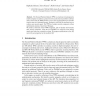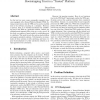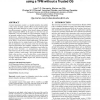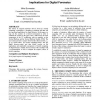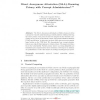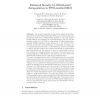122
click to vote
IFIP
2010
Springer
14 years 9 months ago
2010
Springer
The Trusted Platform Module (TPM) is a hardware chip designed to enable computers to achieve a greater level of security than is possible in software alone. To this end, the TPM pr...
142
click to vote
JCP
2008
15 years 2 months ago
2008
Trusted computing platforms have been proposed as a promising approach to enhance the security of general-purpose computing systems. Direct Anonymous Attestation(DAA) is a scheme t...
102
click to vote
CARDIS
2008
Springer
15 years 4 months ago
2008
Springer
This paper introduces the Trusted Execution Module (TEM); a high-level specification for a commodity chip that can execute usersupplied procedures in a trusted environment. The TEM...
USS
2008
15 years 4 months ago
2008
For the last few years, many commodity computers have come equipped with a Trusted Platform Module (TPM). Existing research shows that the TPM can be used to establish trust in th...
117
click to vote
CCS
2006
ACM
15 years 5 months ago
2006
ACM
A trusted monotonic counter is a valuable primitive that enables a wide variety of highly scalable offline and decentralized applications that would otherwise be prone to replay a...
113
click to vote
SAC
2006
ACM
15 years 8 months ago
2006
ACM
The release of computer hardware devices based on “trusted computing” technologies is heralding a paradigm shift that will have profound implications for digital forensics. In...
136
click to vote
ESAS
2007
Springer
15 years 8 months ago
2007
Springer
Abstract. Node compromise is a serious threat in wireless sensor networks. Particular in networks which are organized in clusters, nodes acting as cluster heads for many cluster no...
129
click to vote
ESAS
2007
Springer
15 years 8 months ago
2007
Springer
The Direct Anonymous Attestation (DAA) scheme provides a means for remotely authenticating a trusted platform whilst preserving the user’s privacy. The protocol has been adopted ...
121
Voted
CISC
2007
Springer
15 years 8 months ago
2007
Springer
Abstract. The Trusted Computing Group (TCG) defines the specifications for the Trusted Platform Module (TPM) and corresponding trust mechanisms that allow a TPM-enabled platform ...
119
click to vote
SAC
2009
ACM
15 years 8 months ago
2009
ACM
Usage controls enable the provider of some information to limit how recipients may use it. Usage controls may be desirable in enterprise environments, e.g., for regulatory complia...
